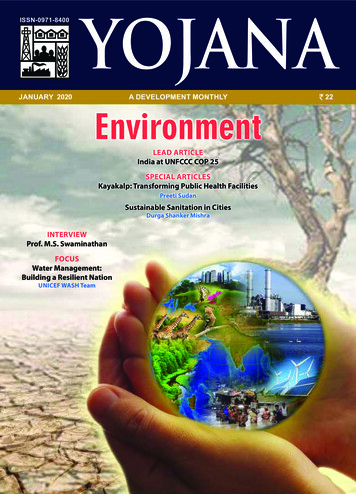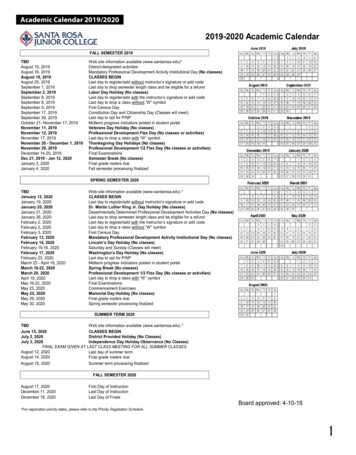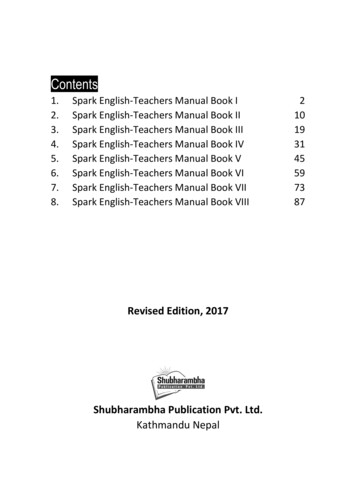
Transcription
ISSN-0971-8400YOJANAJanuary 2020a development monthlyEnvironmentLead articleIndia at UNFCCC COP 25SPECIAL ARTICLESKayakalp: Transforming Public Health FacilitiesPreeti SudanSustainable Sanitation in CitiesDurga Shanker MishraInterviewProf. M.S. SwaminathanFocusWater Management:Building a Resilient NationUnicef Wash Team 22
Development RoadmapThe Prime Minister at the United Nations General AssemblyIt is a great honour for me to address the 74thSession of the United Nations on behalf of 1.3billion Indians.When a developing country is able to successfullyimplement the world’s biggest sanitation campaign,building over 110 million toilets in just 5 years for itscountrymen, all its achievements and outcomes arean inspirational message for the entire world.When a developing country, successfullyruns the world’s biggest health insurance scheme,giving 500 million people the facility of an annualhealth cover of Rs. 500,000 for free treatment; theachievements and responsive systems that resultfrom this scheme show the world a new path.As I came in here, on a wall at the entrance tothis building, I noticed the sign, ‘no more single useplastic’ I am pleased to inform this assembly thateven as I am addressing you today, a very large campaign is being implemented across the entire country to make Indiafree of single use plastic.In the next 5 years, apart from promoting water conservation, we are going to ensure water supply to 150 millionhomes. We are going to build over 125,000 kilometers of new roads. By the year 2022, when India celebrates its 75thIndependence day, we plan to build 20 million houses for the poor. Though the world may have set itself the target oferadicating TB by 2030, in India we are working towards eradicating it by 2025.About 3000 years ago, a great poet of India, Kariyan Pungun-dra-naar, wrote in Tamil the most ancient language ofthe world: “Ya-dum, Oo-ray, Yaav-rum Ke-rir”, which means “We belong to all places, and to everyone.” This sense ofbelonging beyond borders, is unique to India.In the last 5 years, India has worked towards strengthening its centuries old great tradition of fraternity amongnations and welfare of the world, which is indeed, in line with the key objectives of the United Nations. The issues thatIndia raises, the kind of new global platforms that India has come forward to build, seek collective efforts to addressserious global challenges and issues.If you look at it from a historic and per capita emission perspective, India’s contribution to Global Warming is verylow. However, India is one of the leading nations when it comes to taking steps to address this issue. On one hand, weare working towards achieving the target of 450 Giga Watts of renewable energy, and on the other hand, we have alsotaken the initiative to create the International Solar Alliance. One of the effects of Global Warming is the increasingnumber and severity of natural disasters, and at the same time they are appearing in new areas and in new forms. In viewof this, India has initiated the formation of the “Coalition for Disaster Resilient Infrastructure” (CDRI). This coalitionwill help build infrastructure which can withstand natural disasters.The face of the world is changing today. Modern technology in the 21st century is bringing about sweepingchanges in social life, personal life, economy, security, connectivity and international relations. Neither do we have theoption to confine ourselves within our boundaries. In this new era, we will have to give new direction and energy tomultilateralism, and to the United Nations.One hundred and twenty-five years ago, the Great Spiritual Guru, Swami Vivekananda, gave this message tothe world during the World Parliament of Religions in Chicago. The message was, “Harmony and Peace and notDissension”.Today, the message from the world’s largest democracy, for the International community is still the same: “Harmonyand Peace”.(Excerpts from the PM's speech at UNGA on 27 September, 2019)Source: Press Information Bureau
Website: www.yojana.gov.inJanuary 2020CHIEF EDITORRajinder ChaudhryEditorSVolume-64No. 1Let noble thoughts come to us from all sidesRig VedaShuchita chaturvedisumita mukherjeeYOJANASince 1956A DEVELOPMENT MONTHLYIn This IssueJoint Director (Production)Vinod Kumar MeenaCOVER DESIGNGajanan Pralhadrao DhopeOur RepresentativesAhmedabad: Janhavi Patel, Bengaluru: B.K.Kiranmai Bhubaneswar: Girish Chandra Dash,Chennai: Sanjay Ghosh,Guwahati: RamaniKant Sharma, Hyderabad: Vijayakumar Vedagiri,Jalandhar: Gagandeep Kaur Devgan, Kolkata:Khurshid Malik, Mumbai: Umesh SadashivaraoUjgare: Thiruvananthapuram: Roy ChackoLead Articlespecial articlesUnion Minister for Environment,Forest and Climate Changeat UNFCCC COP 25. 7Kayakalp: Transforming PublicHealth FacilitiesPreeti Sudan.11Sustainable Sanitation in CitiesDurga Shanker Mishra.15FocusChief Editor’s Office:Room No. 763, Soochna Bhawan, CGO Complex,Lodhi Road, New Delhi- 110 003, Phone: 24369422Water management: Building aResilient NationUnicef Wash Team. 22Yojana (English): Room No. 647, Soochna Bhawan,CGO Complex, Lodhi Road, New Delhi - 110 003.E-mail (Editorial): yojanace@gmail.comYOJANA seeks to provide a vibrant platform fordiscussion on matters of social and economicdevelopment of the country through in-depthanalysis of these issues in the wider context ofgovernment policies. Although published bythe Ministry of Information and Broadcasting,YOJANA is not restricted to expressing the officialpoint of view.DISCLAIMER: The views expressed in variousarticles are those of the authors' and theydo not necessarily reflect the views of theGovernment or the organisation they workfor. l Maps/flags used in the articles are onlyindicative. They don't reflect the political mapor legal representation of the flag of India/anyother country. l The readers are requested toverify the claims made in the advertisementsregarding career guidance books/institutions.YOJANA does not own responsibility regardingthe contents of the advertisements.Role of Community Radio inDisaster Management andClimate-change CommunicationNuti Namita.29InterviewIn Conversation withProf. M.S. Swaminathan.32Emerging Civil Society Initiativesin AgricultureChandra Sekhara Rao Nuthalapati.43SUBSCRIPTIONManaging Electronic WasteManjula Wadhwa.471 year 230, 2 years 430, 3 years 610.For new subscriptions and renewals, pleasecontact: Phone: 011-24367453 or e-mail yourqueries to: pdjucir@gmail.comDevelopment and EnvironmentS. C. Lahiry.51For grievances/complaints, please write to us at:helpdesk1.dpd@gmail.comBusiness Wing (Hqrs.): Phone: 011-24367260,24365609, 24365610 Publications Division,Room No. 56, Soochna Bhawan, CGO Complex,Lodhi Road, New Delhi-110 003.Mitigation of Carbon Footprintfor Sustainable & Healthy LivingDr. T. V. RamachandraBharath Settur, Vinay S.Bharath H. Aithal.36“Those years [1960s], there were veryfew issues of Yojana, where my articlewould not have appeared”Plastic Waste in Constructionand Road MakingDr. Ashok G. Matani.56National Voters’ Day 2020Umesh Sinha.59Regularsdevelopment roadmap.Cover-IIdo you know?. 62Number of pages: 64Details of the Sales Outlets of the Publications Division on page 20Website: www.publicationsdivision.nic.in@DPD India@publicationsdivisionYOJANA is published in Assamese, Bengali, English, Gujarati, Hindi, Kannada, Malayalam, Marathi, Odia,Punjabi, Tamil, Telugu and Urdu.
Online & Distance Learning CoursesQuality IAS & IFS preparationAnytime, Anywhere accessBenefits to you when you join our Online or DistanceLearning Course Classroom lectures and video-tutorials with the same faculty who teach inEvolution Classroom Courses Study-material in tune with the actual demands of the IAS & IFS examinations Well planned courses with timely completion and streamlined coverage Structured guidance from the core faculty on examination and answer writingstrategy Ample practice questions to practice Evaluation and feedback by the faculty on your answersDistance Learning ProgrammeOnline Learning Programme Quality study material (in Printed form)covering the entire prescribed syllabusfor both IAS & IFS Examinations with therequired depth and organizationexpected by the UPSC Video lectures and tutorials by Evolutionfaculty, covering all the vital areas of theUPSC IAS & IFS syllabus Study material is based on all theauthoritative and current sourcesrelevant for the IAS & IFS Examinations 200 practice questions plus 4 MockTests to build a strong practice base Answer evaluation by faculty Section-wise video guidance by facultywww.evolution.co.in/distance-learning Quality study material LectureHandouts (both in PDF form) coveringthe entire prescribed syllabus for bothIAS & IFS Examinations with the requireddepth and organization expected by theUPSC. Study material is based on all theauthoritative and current sources. 200 practice questions plus 4 MockTests to build a strong practice base Answer evaluation by facultywww.evolution.co.in/onlineEvolution Educare Pvt. Ltd.B-11, 2nd Floor, Commercial ComplexMain Road, Dr. Mukherjee Nagar, DELHI - 9409810 975 937011-4709 2329www.evolution.co.inYE-1369/2019General Studies, IAS Prelims GS, Current Affairs,Botany, Zoology, Agriculture, Forestry, GeologyYOJANA January 2020
YOJANATime to ActThe air quality index touches alarmingly dangerous levels frequently;contamination of groundwater is a stark reality of today; water tablesare receding; oceans are rising; air is being polluted by vehicles andindustries; plastic waste is clogging the entire ecosystem and landfills arebecoming a part of the skyline of our cities.The environment is showing signs of this degradation which is bound toaffect each one of us. Frequent floods, drought, abrupt weather cycle, croppattern changes, receding coastal areas are some of these red flags glaring atthe humanity. Decades of environmental decay is eventually posing threat tothe entire ecosystem we are in – living standards are compromised, health isaffected, and above all, it questions the entire existence of the current modelsof growth and development.Sustainability and development need to go hand in hand. The waste wegenerate, if not properly managed, is a burden to the environment – singleuse plastic is an evident example of this use-and-throw culture of wastegeneration we have developed over the years. There is an economy around environment, and also the economyin general is impacted by climate change and its mitigation. This poses a challenge and also an underlyingopportunity.Environment is a typical case of what we sow, so we reap. Our collective actions impact the environmentwe share, as climate change doesn’t distinguish between rich and poor. With the time running out to contain theill-effects on environment, the recently held Conference of the Parties under the United Nations FrameworkConvention on Climate Change (UNFCC COP 25) in Madrid, Spain was seen as a window of opportunity.Together, the world has to come to a consensus to stand as one to overcome this challenge.India has shown leadership and commitment on environmental issues. Achieving targets for renewableenergy under the Paris Agreements push for e-vehicles and vehicle emission norms, Coalition for DisasterResilient Infrastructure and International Solar Alliance are some of the fronts in which India has led byexample.This issue of Yojana gives detailed analyses on an array of topics concerning environment. We are fortunateto have the perspective of Prof. M.S. Swaminathan in the issue, who has been contributing to Yojana since1960s and has shared his profound views on promoting sustainable agriculture and climate change.The environment is at the brim. It is our collective responsibility to work together for providing a brighterfuture for the coming generations – a lifestyle that is self-sustaining, resources that are adequate for all,development that is not compromising our ecosystem, flora-fauna and wildlife that are in safe hands and theland, water and air that are fit for humans and other forms of life.This Environment issue of Yojana is a reminder of what Gandhiji had envisioned by saying, ‘the world has enough for everyone's need, but not enough for everyone's greed.’ The time to act is now.YOJANA January 20205
YE-1357/20196YOJANA January 2020
lead articleIndia at UNFCCC COP 25The Union Minister for ation&Broadcasting and Heavy Industries& Public Enterprises Shri PrakashJavadekar delivered India’s Statementat the 25th session of Conference ofParties under the UN frameworkconvention of Climate Change(UNFCCC COP 25), in Madrid,Spain on 10 December, 2019.Following is the Statement (Excerpts):Madam President, Excellencies,Ladies and Gentlemen,At the outset I would like to quoteMahatma Gandhi who said “Thefuture depends on what we do today”.I would like to convey ourappreciation to the Government ofSpain for hosting COP 25 at a shortnotice and for making excellentarrangements. WeassurethePresidency of Chile of our full supportfor a successful COP.Climate change is real. Theworld recognised it and adopted acomprehensive agreement in Paris.Let us concentrate on implementationof Paris Agreement and not digress.If there is an inconvenient truth inthe form of climate change, we areproviding a convenient action plan.We are walking the talk.India has reduced emissionsintensity of GDP by 21 percent and ison track to achieve the goal of 35%emissions reduction as promised inParis.Prime Minister Modi announced175 Giga Watts targets for renewablesunder Paris Agreement. We havealready achieved 83 Giga Watts. PrimeMinister has subsequently increasedYOJANA January 2020the target to 450 Giga Watts at therecent UN Climate Action Summit.We are simultaneously progressing onsolar, biomass and wind energy.We have put carbon tax on coalproduction at the rate of Dollars6 per tonne. Even with 36 partiesrepresented in Parliament, we couldachieve this unanimously.The headline is that a commercialflight was operated on 100 percentbiofuel and we are targeting blendingof 20% ethanol in petrol by 2030.We have leapfrogged from BharatStandard IV to Bharat Standard VIfor vehicle emission norms and from1 April, 2020, vehicles will be BS VIcompliant.360 million LED bulbs havebeen fitted in homes, and 10 millionconventional streetlights have beenreplaced with LED lights. Thereis also a strong push for use ofe-vehicles by introducing multiplepolicy interventions and incentives.We have provided 80 million LPG gasconnections replacing conventionalfirewood cooking stoves. Our coolingaction plan and adaptation plan areworking well and will achieve ourtargets.We have promised creation ofadditional carbon sinks of 2.5 to 3billion tonnes of carbon equivalentthrough increasing green cover. Inlast five years, our green cover hasincreased by 15,000 sq. km. We areundertaking special projects like urbanforests, school nursery, agroforestry,water and fodder augmentation in theforest area.India prioritises adaptation asan integral part of climate actions.Therefore, India will be investingabout 50 million dollars in waterconservation. India has taken up atarget for restoration of 26 million ofdegraded land by 2030 during the 14thCOP of UN Convention to CombatDesertification in Delhi. This is oneof the largest programs in the world toensure carbon sink in land resources.100% neem coating of urea fertilizer7
BASIC Ministerial Joint Statement at UNFCCC COP 25Following is the BASIC Ministerial Joint Statement atthe 25th session of Conference of Parties under the UNframework convention of Climate Change (UNFCCCCOP 25), in Madrid, Spain.1. The Ministers of the Brazil, South Africa, India andChina group (BASIC) met during the 25th Conferenceof Parties to the United Nations Framework Conventionon Climate Change (COP 25) in Madrid, Spain, on10th December 2019. The meeting was chaired byH.E. Mr. Zhao Yingmin, Vice Minister of Ecologyand Environment of the People’s Republic of China,and attended by H.E. Mr. Ricardo Salles, Minister ofthe Environment of Brazil, H.E. Ms. Barbara Creecy,Minister of Environment, Forestry and Fisheries ofthe Republic of South Africa, and H.E. Mr. PrakashJavadekar, Minister for Environment, Forest andClimate Change and Information and Broadcasting ofthe Republic of India.2. The Ministers pledged their full support to theChilean COP Presidency, expressed their gratitudeto the Kingdom of Spain for hosting the meetingand noted that the central mandate of COP 25 is toprepare the way for the full implementation of theParis Agreement in the post-2020 period buildingupon the climate action efforts under the Conventionand its Protocol. They further stated that the progresson the pre-2020 agenda will be the benchmark ofsuccess for this COP. The Paris Agreement, adoptedunder the United Nations Framework Conventionon Climate Change, represents a key milestone inthe progressive development of multilateralism toenable the international community to collectivelyaddress climate change, which is of pressing globalconcern. The Ministers stressed that this achievementwill be defended and built upon and called upon theinternational community to focus on the comprehensiveand faithful implementation of the Paris Agreement.is appreciated by the world and 170million soil health cards are takingcare of the soil health, thus creatingmore carbon sinks.Internationally, we launchedthe Coalition for Disaster ResilientInfrastructure which is a partnership tosupport countries through knowledgeexchange and provide technicalsupport on developing disaster andclimate resilient infrastructure.Only 6 countries are on track to83.4.Such implementation must be in accordance withthe Convention’s goals and principles, including theprinciples of equity and common but differentiatedresponsibilities and respective capabilities, in light ofdifferent national circumstances.Ministers underlined that COP 25 should achieveoutcomes as follows:i) To conclude the negotiations related to article 6 ofthe Paris Agreement;ii) To mandate a 2-year Work Programme under SBIto assess the pre-2020 progress and gaps, with aview to making the necessary arrangements to fillthose gaps;iii) To urge developed country Parties to fulfil theircommitments on providing finance, technologydevelopment and transfer and capacity-buildingsupport to developing countries;iv) To interpret and implement the provisions of theParis Agreement in a holistic and faithful manner.Ministers underscored the importance of concludingthe discussions on Article 6 of the Paris Agreement,in accordance with the mandates and principlesset out in the Agreement and the accompanyingdecision, including ensuring environmental integrity.Ministers emphasized the importance of keepinga balance of the mechanisms under Article 6.2 andArticle 6.4, that share of proceeds should be collectedunder both Article 6.2 and Article 6.4, to contribute toAdaptation Fund. A decision on Article 6, includingits governance and a smooth transition from theClean Development Mechanism would preserve theintegrity and credibility of the multilateral systemand send a strong message to the private sector ontheir engagement and crucial role in achieving theobjectives of the agreement. Any unilateral measuresand discriminatory practices that could result inmeet their NDCs announced in Paris.We are leading the pack. Sustainablelifestyle is a part of the ethos of India.It is time for reflection andassessment as we near the end of Pre2020 period. It is time to look in themirror. Has developed world deliveredon its promises? Unfortunately,annexed countries have not met theirKyoto Protocol targets. Neither theirNDCs reflect ambitions nor have theyshown willingness to enhance theircommitments. I propose that we havethree more years to fulfill pre-2020commitments till the global stock taketakes places for bridging emissiongaps.I draw your attention to veryimportant issue of finance. Developedworld promised 1 trillion dollar inlast 10 years, and not even 2 percenthas materialised. It has to be publicfinance and there should be no doubleaccounting. The world that benefitedYOJANA January 2020
5.6.7.market distortion and aggravate trust deficit amongstParties must be avoided.Recalling that the Paris Agreement represents a delicatepolitical balance negotiated amongst 195 Parties withdiverse levels of development and distinct nationalcircumstances, the Ministers expressed grave concernregarding the current imbalance in the negotiations. Inparticular, there has been a lack of progress on the pre2020 Agenda, adaptation and issues related to means ofimplementation support, in the form of climate finance,technology transfer and capacity building support,which is essential to empower developing countriesto contribute their best effort to the internationalcommunity’s collective response to climate change.This imbalance needs to be immediately rectified, inthe interests of a successful conference outcome andachieving the global goals in the Paris Agreement.Ministers reiterated that ambition of Parties ismeasured first and foremost by the implementation ofits commitments. Commitments made by developedcountries in the pre-2020 period must be honoured,because the completion of the pre-2020 Agenda is ofcritical importance in building the basis for mutual trustand ambition in the post-2020 period. The pre-2020gaps with regard to mitigation, adaptation, means ofimplementation and reporting by developed countriesmust be assessed and closed, without transferring anyburden to developing countries. The pre-2020 Agendawill be concluded when the pre-2020 ambition gapshave been closed and not at the end of this conference.The ambitious implementation of developed countries’commitments to provide support to developingcountries is a precondition to any discussion onprogression of current commitments.Ministers underscored that the periodic review of thelong-term global goal under the Convention and ofoverall progress towards achieving it, is a mechanismwith clear mandates under the UNFCCC and animportant process that reaffirms the Convention asfrom carbon emissions that madethem developed, must repay.Technology development andtransfer at affordable costs is crucialfor developing countries. If we aredealing with a disaster, nobodyshould profit from it. So, my proposalis to have more joint research andcollaboration, grant finance madeavailable for meeting the targets.COP 25 is an important stepin our collective journey towardsYOJANA January 20208.the preeminent international forum for addressingclimate change. Ministers stressed that the scope ofthe periodic review is different from the 2-year pre2020 Work Programme and Global Stocktake, sinceeach of these processes have their specific technicalarrangements. In the design of the periodic review,coordination with and requests for information torelevant bodies will to avoid duplication of work. Theoutcome of the 2-year pre-2020 Work Programmecould feed into the periodic review as an element, andtogether the two processes should serve as a usefulinput to the Global Stocktake.Ministers highlighted that BASIC countries areimplementing ambitious climate actions based ontheir national circumstances and have achieved greatprogress, contributing significantly to global effortsin combating climate change. This is notwithstandingthe insufficient and uneven progress of their domesticdevelopment and the multiple challenges all BASICcountries face, including in poverty eradicationand achieving socio-economic development andenvironment protection. In 2018, China reduced carbondioxide emissions per unit of GDP by 45.8% from2005 levels, as well as increased the share of nonfossil fuels in primary energy consumption to 14.3%.South Africa has recently implemented a carbon taxand announced a massive renewable energy programin its latest electricity plan. India has already achieveda 21% reduction in emission intensity of GDP in 2014compared to 2005 levels, thereby achieving its pre-2020voluntary target. In 2015, Brazil had already achieved a58% emission reduction relative to the business as usualscenario set for its NAMAs, thereby overachieving itstarget of 36%-39% reductions set for 2020. BASICcountries have already set forth climate policies andcontributions reflecting our highest possible ambition,above and beyond our historical responsibilities. Thetime for action is now, and not next year or thereafter.a clean, green and healthy planet.Market and non-market mechanismsplay an important role. We expect thatguidelines for Article 6 will ensuretransition of Clean DevelopmentMechanism under Kyoto Protocol andprovide the incentives and positivesignals to private sector, which hadinvested in it. We also urge support forthe vulnerable communities worldwidewith a strong Warsaw InternationalMechanism for Loss and Damage withprovision for financial support.Source: Press Information BureauThis is the time for ownershipand this is the time for responsibleaction. India has and willcontinue to do its bit - expectingcommensurate multilateral actionwith developed countries takingthe lead.Let me end by quoting Thoreau,“What is the use of a house, if youhaven’t got a tolerable planet to putit on?” (Source: Press Information Bureau)9
YE-1356/201910YOJANA January 2020
special articleKayakalp: Transforming Public Health FacilitiesPreeti SudanKayakalp initiative of the Ministry of Health & Family Welfare began in 2015 with the aimof improving infrastructure upkeep, hygiene and sanitation, and infection control practices inCentral Government institutions and public health facilities in all States and UTs.TMahatma Gandhi and Sanitationhe Father of the Nation, MahatmaGandhi was concerned for publicand private sanitation which was also apart of his Satyagraha campaign sincethe days he spent in South Africa. ForGandhiji, the drive for cleanlinessin society was an integral part of theprocess in bringing about a castelessand free society. “Everyone is his ownscavenger,” said Gandhiji, reiteratingthe fact of making cleanliness apersonal responsibility and thekey to removing untouchability. InSouth Africa itself, Gandhiji took toscavenging and propagated the adviceamong Indians to keep their lavatoriesclean and dry. Once he returned toIndia, his focus on sanitation grewstronger. He firmly emphasised onthe need for education on hygiene andsanitation among Indians and stated“the scavenger’s work must be ourspecial function in India.” Gandhijilaid down the need for having cleanwater and air and the precise methodof dealing with open defecation.“Swaraj ought to begin with ourstreets,” he always said.on his 145th birth anniversary. Thismission aimed to eradicate opendefecation by 2 October, 2019, the150th birth anniversary of MahatmaGandhi, by constructing 9 croretoilets in rural India at a projectedcost of Rs. 1.96 lakh crore, spanning4,041 statutory cities and towns. Thedrive has been categorised in two submissions, Swachh Bharat Abhiyan(Urban) that operates under theMinistry of Housing and Urban Affairsand Swachh Bharat Abhiyan (Rural)that falls and operates under Ministryof Jal Shakti (erstwhile Ministry ofDrinking Water and Sanitation). Thismission became a national priorityand the Prime Minister urged everyIndian to join it and clean up the areasaround them.This October, as we celebratedthe 150th birth anniversary of Gandhijiand the third anniversary of SwachhBharat Abhiyan, the Prime Ministerdrew on Gandhiji’s views on sanitationto emphasise the fact that MahatmaGandhi’s dream of a Clean India canonly be realised when 125 crore peoplecome together. This mission is directlylinked with the economic health ofthe nation and its accomplishmentwill not only contribute to the GDPgrowth of the country but will alsoreduce the associated health costs.Swachh Bharat Abhiyan has been aninternationally acclaimed, countrywide, visionary programme whichaims to spread the message of“Swachhata” across each household,village, and city of India.Gandiji has said, ‘SanitationismoreimportantthanIndependence’. Our Hon’ble PrimeMinister took inspiration fromGandhiji’s ideas on hygiene andstarted a campaign, ‘Swachh BharatAbhiyan’ or ‘Clean India Mission’The author is Secretary, Ministry of Health & Family Welfare, Government of India. Email: secyhfw@nic.inYOJANA January 202011
the number of “satisfied” patients asreported through “Mera Aspataal”, anICT-based patient feedback system.Cities are much better off in terms of infrastructure compared to the new small towns.To contribute to this nationalmovement and addressing thegrowing challenges of sanitationand hygiene, the Ministry ofHealth & Family Welfare adopted amulti-pronged strategy and launchedmany initiatives for improvinghygiene and sanitation holistically.Since 2015, it has particularly madesanitation a centrepiece of its effortsto improve the health and wellbeing ofour citizens. These initiatives addresshygiene and sanitation within healthfacilities as well as in the communitythrough its own programmes and alsoin partnership with other Ministries toaddress the issue holistically.Kayakalp initiative of theMinistry of Health & FamilyWelfare began in 2015 with theaim of improving infrastructureupkeep, hygiene and sanitation, andinfection control practices in CentralGovernment institutions and publichealth f
Yojana (English): room no. 647, soochna Bhawan, cGO complex, lodhi road, new delhi - 110 003. E-mail (Editorial): yojanace@gmail.com YOJANA seeks to provide a vibrant platform for discussion on matters of social and economic development of the country through in-depth analysis of










